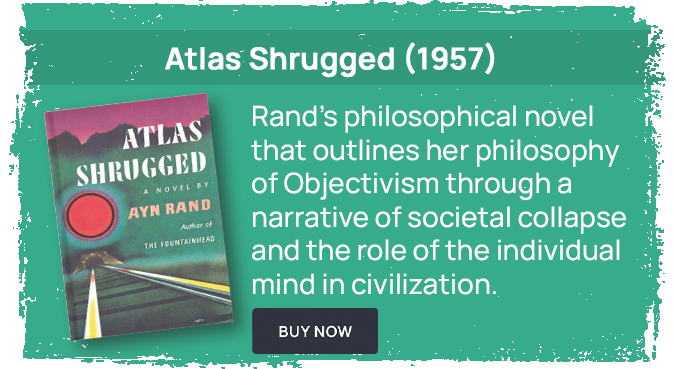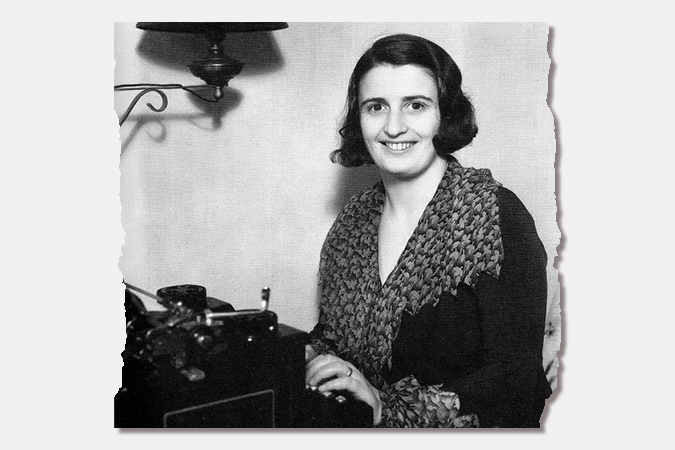
Ayn Rand, a Russian-American writer and philosopher, left an indelible mark on literature and political thought in the 20th century. Best known for her novels The Fountainhead and Atlas Shrugged, her work continues to influence readers, thinkers and policymakers even decades after.
Early Life and Career
Born Alisa Zinovyevna Rosenbaum in 1905 in St. Petersburg, Russia, she witnessed the Bolshevik Revolution firsthand. This experience shaped her lifelong opposition to collectivism and state control.
In 1926, she emigrated to the United States and changed her name to Alice O’Connor, where she pursued a career in Hollywood as a screenwriter before turning to fiction. She adopted the pen name of Ayn Rand and moved from New York through Chicago to Los Angeles. It was this name that we know her with today.
Ayn Rand's Literary Works
Ayn Rand’s literary career spanned several decades, during which she produced influential novels, plays and non-fiction works. Her most notable books include:







Main Themes in Ayn Rand Books
Ayn Rand’s fiction is characterized by several recurring themes:




Rand's Philosophy: Objectivism
Objectivism, the philosophical system developed by Ayn Rand, is central to understanding her literary works and their impact. The main tenets of Objectivism include:
- Reality is objective and absolute
- Reason is man’s primary means of perceiving reality
- The individual’s highest moral purpose is the pursuit of their own happiness
- Laissez-faire capitalism is the ideal economic system
Rand’s philosophy has been both praised for its emphasis on individual rights and criticized for its perceived lack of empathy and rejection of altruism.
Literary Impact and Criticism
Ayn Rand’s novels have sold millions of copies worldwide and continue to be widely read today. The Fountainhead and Atlas Shrugged in particular have achieved cult status among certain readers, especially those drawn to Rand’s individualistic philosophy.
However, Rand’s work has also faced significant criticism from literary scholars and critics. Some argue that her writing is didactic and her characters lack depth, serving primarily as mouthpieces for her philosophical ideas. Others praise her ability to create compelling narratives that explore complex philosophical concepts.
Despite mixed reception, Rand’s influence on popular culture and thought is undeniable. Her ideas have inspired generations of readers to question societal norms and consider the role of the individual in society.
Political and Economic Influence
Ayn Rand’s ideas have had a profound impact on political and economic thought, particularly in the United States. Her philosophy has been embraced by many libertarians and conservatives who advocate for limited government and free-market policies.
Notable figures influenced by Rand’s work include:



Rand’s ideas have also influenced economic policies, particularly the push for deregulation and free-market solutions in the 1980s and beyond. However, critics argue that her philosophy can lead to extreme selfishness and a lack of concern for social welfare.
The Ayn Rand Institute and Ongoing Legacy
Founded in 1985, the Ayn Rand Institute works to promote Rand’s philosophy and keep her ideas in the public discourse. The organization offers educational programs, publishes books and articles, and sponsors essay contests for students.
Rand’s legacy continues to be debated and discussed in academic and popular circles. While some view her as a champion of individual liberty and capitalism, others criticize her philosophy as promoting selfishness and disregard for social responsibility.
Adaptations and Popular Culture

Ayn Rand’s work has been adapted for various media, further extending its cultural reach:
- The Fountainhead was made into a film in 1949, starring Gary Cooper and Patricia Neal.
- Atlas Shrugged was adapted into a film trilogy between 2011 and 2014, although it received poor reviews and limited commercial success.
- References to Rand and her work appear in numerous TV shows, films, and books, often as shorthand for extreme individualism or libertarian ideology.
Relevance in the 21st Century
Ayn Rand’s impact as an author and philosopher is undeniable. Her novels have sold millions of copies and continue to inspire readers worldwide. While her ideas remain controversial, they have significantly influenced political and economic thought, particularly in the United States.
Rand’s literary legacy is complex. On one hand, her work has inspired many to question societal norms and pursue their individual passions. On the other, her philosophy has been criticized for promoting selfishness and disregarding social responsibility.
As societies continue to grapple with questions of individual liberty, economic systems, and social responsibility, Ayn Rand’s ideas remain relevant to these discussions. Whether one agrees with her philosophy or not, understanding Rand’s work is crucial for engaging with many of the political and economic debates of our time.
Ultimately, Ayn Rand’s writing legacy is a testament to the power of ideas expressed through literature. Her novels and philosophy continue to provoke thought, debate, and action, ensuring that her influence will be felt for generations to come.
Look up more recommendations of influential classic works HERE





